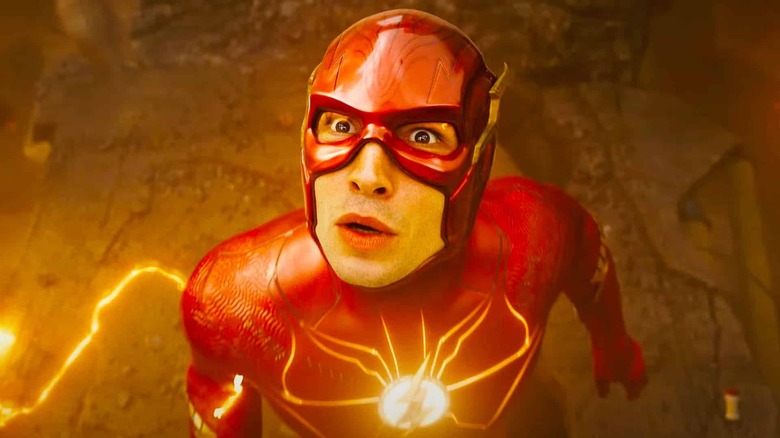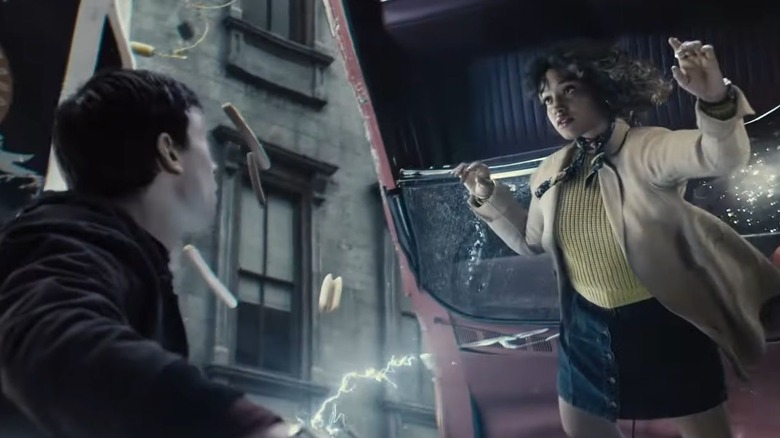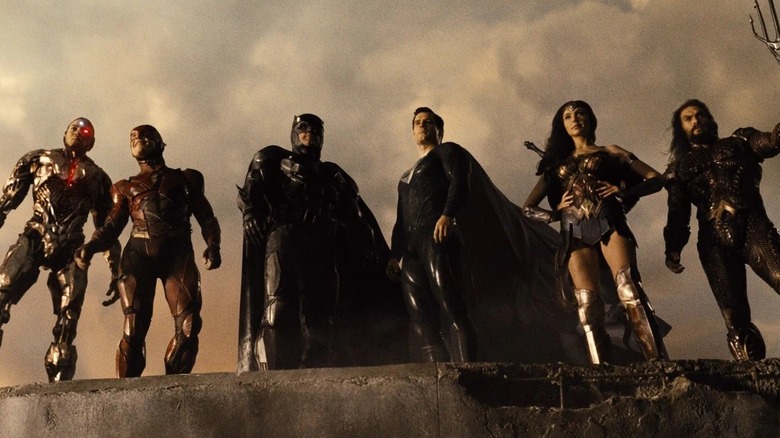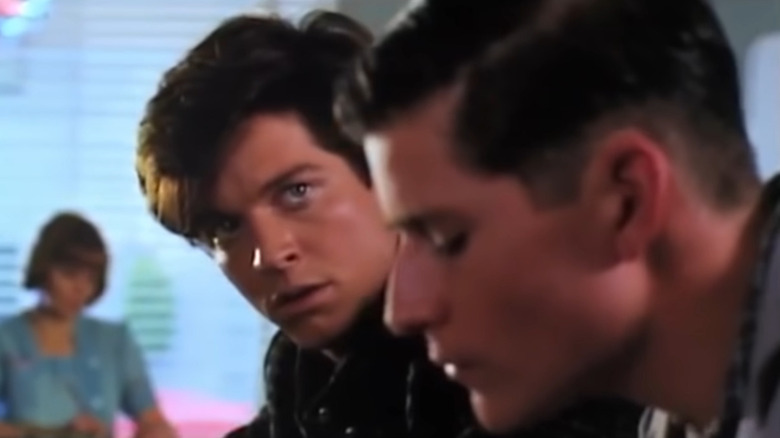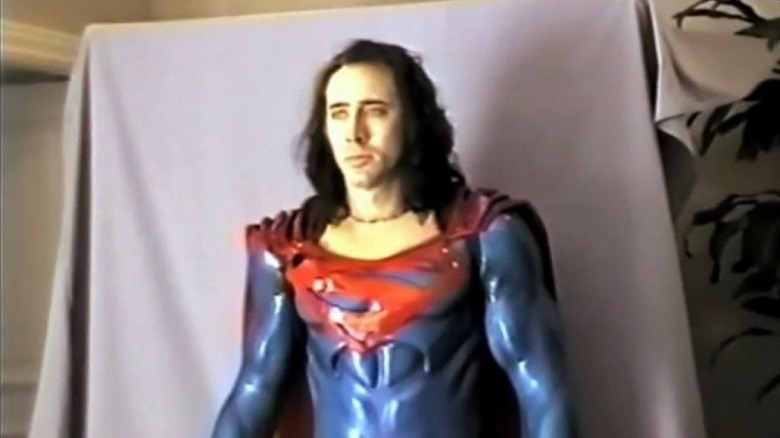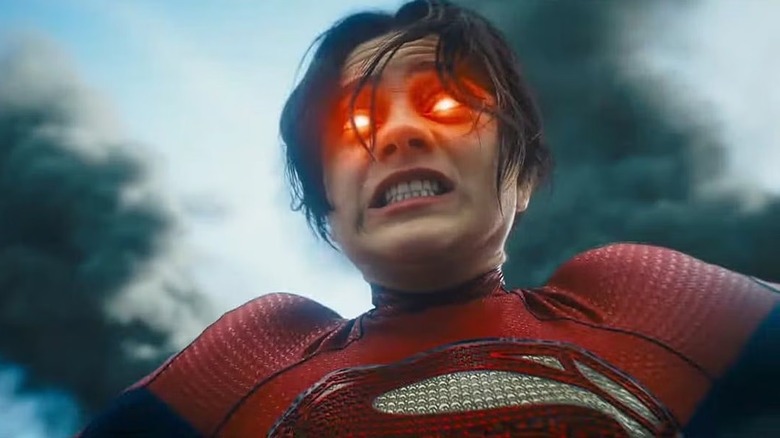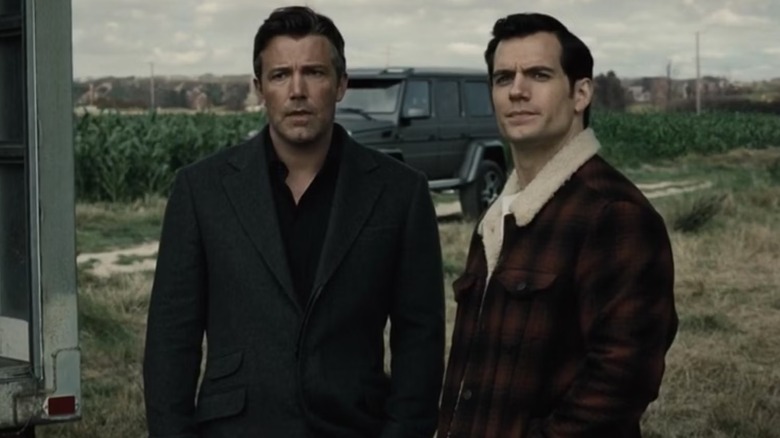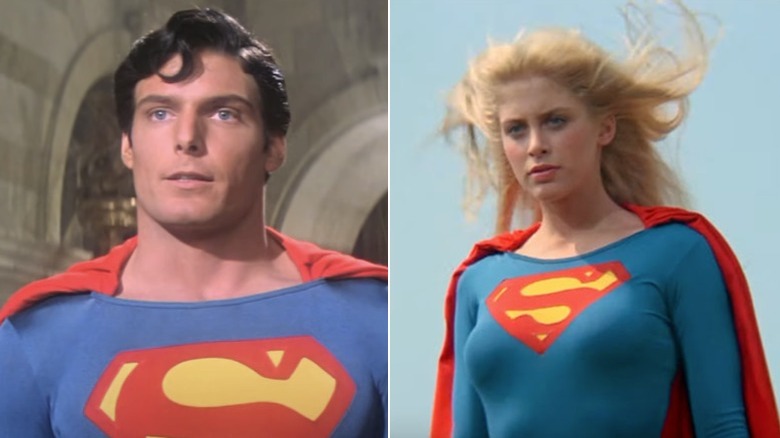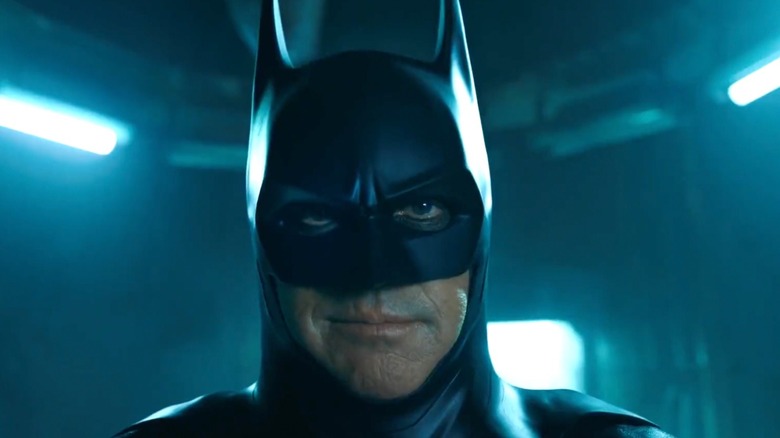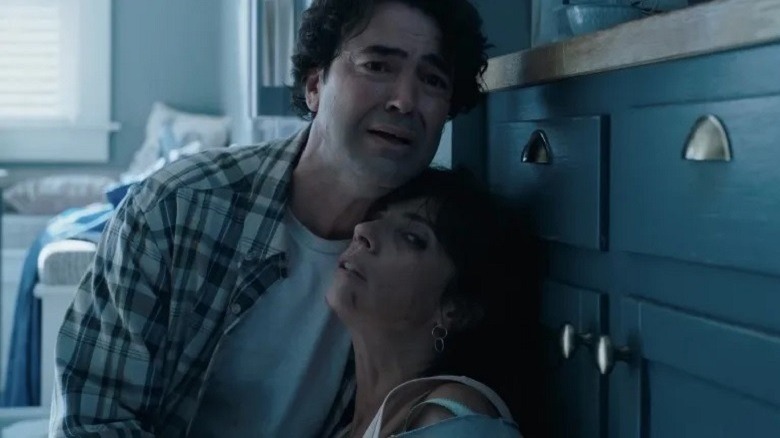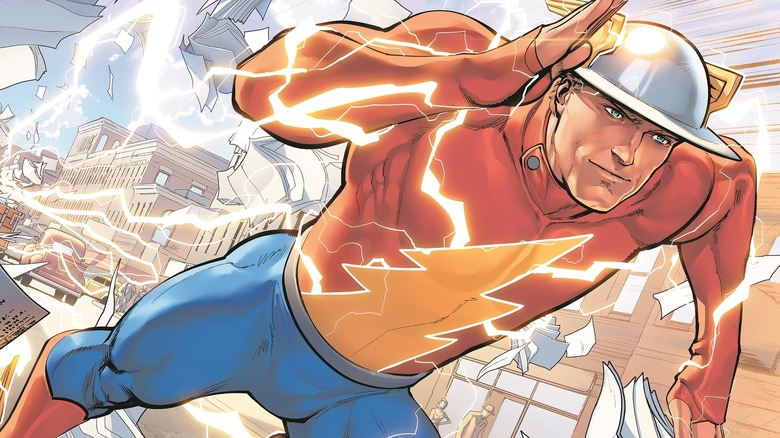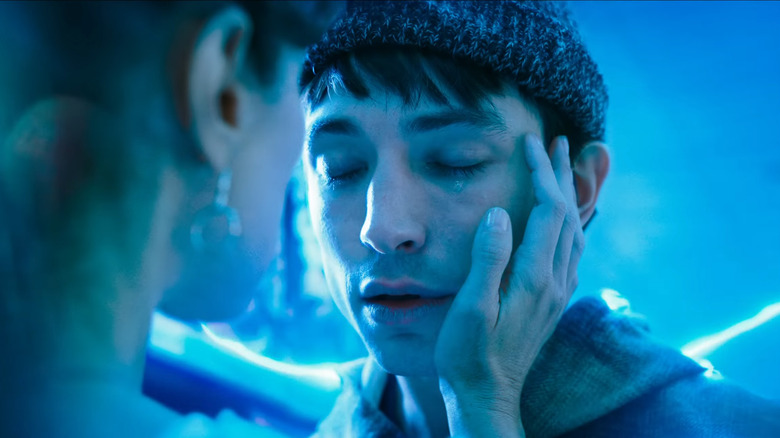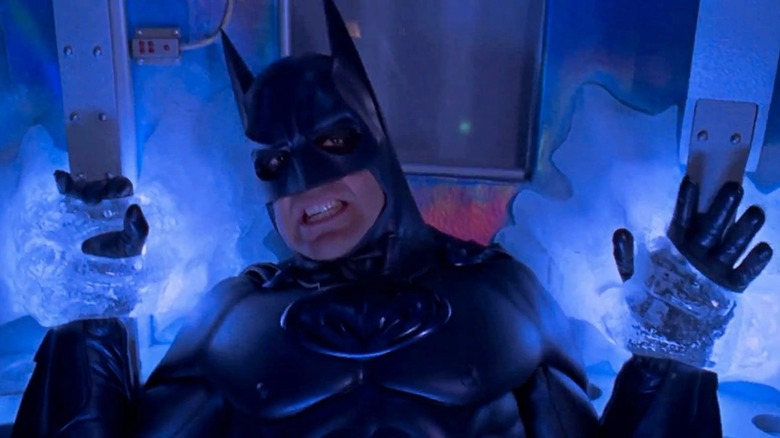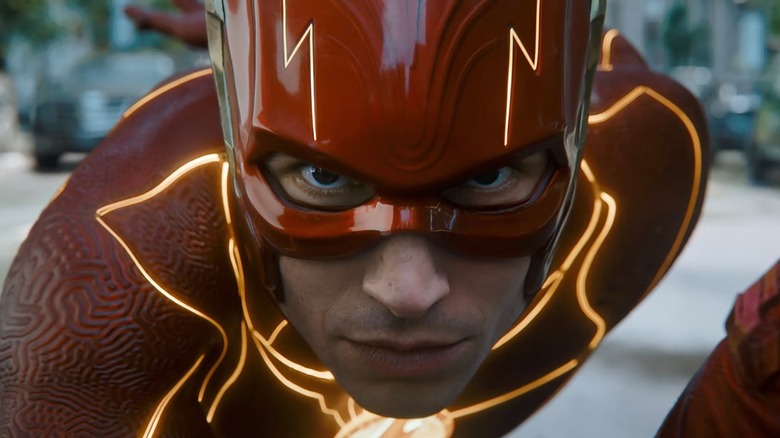Everything The Flash Changes About The DC Universe
Contains spoilers for "The Flash."
Fun fact: Michael Keaton was still in high school when "The Flash" was announced as a project. Jokes aside, this production has gone through numerous directors, screenwriters, and even studio heads as the movie about the Fastest Man Alive took its sweet time to arrive in theaters. In many ways, it is the systemic result of all the turbulence Warner Bros. and DC have experienced in their quest to create a shared cinematic universe to compete with Marvel's heroes over at the House of Mouse. Nonetheless, it's here now — and it's set to be one of the last films before DC Studios, under the watch of James Gunn and Peter Safran, kickstarts a new era.
Considering that "The Flash" is a multiverse adventure, most fans expected it to be the great reset for the DC Universe, leaving only the pawns on the chessboard that Gunn and Safran choose to use moving forward. The Andy Muschietti-directed film addresses a few of the questions the audience has about this universe as it stands, while also providing a couple of answers about what may lay ahead and what is now considered canon. Of course, as history has shown, anything is possible at Warner Bros. and DC — all that's required is another merger and the state of the universe might be in flux again.
That being said, let's race into the Speed Force and find out what "The Flash" changes about the DC Universe.
Zack Snyder's Justice League is now the canonical version
The name Zack Snyder must still send shivers down the spines of the old regime at Warner Bros. The fallout and drama surrounding 2017's "Justice League" will be written about for decades and used as a case study of how not to handle blockbuster production. Undoubtedly, the theatrical cut of the film, which is now widely accepted to have been mostly reshot and repackaged by Joss Whedon, is not fondly remembered by critics or fans. While "Zack Snyder's Justice League" — also known as the Snyder Cut — was released in 2021 to a far more positive reception, it has never been acknowledged as canonical in the DC Extended Universe.
However, "The Flash" more than confirms that the Snyder Cut is canon. When Iris West (Kiersey Clemons) meets Barry Allen (Ezra Miller) in the movie, it's revealed they know each other from school. Iris does tell Barry that she thinks they might have bumped into each other more recently, giving him a knowing look. Of course, he denies it.
The incident she alludes to is a scene from the Snyder Cut in which Barry saves Iris from a car crash using his super-speed. It had originally been planned for the theatrical cut, but it was removed from Whedon's version. That being said, it's good to see that the better incarnation of that film is finally being acknowledged, regardless of whatever supposed sour grapes exist between the director and studio.
The Justice League is dismantled
There's a moment at the beginning of "The Flash" in which the Justice League is mentioned, and it's made obvious the members try to help each other whenever possible. Like any other colleagues, though, they might have prior engagements, such as battling sea monsters or stopping a volcano from decimating an island halfway across the world, so it's unlikely they would be able to drop everything and have a weekly Monday morning meeting to catch up.
After Barry Allen races across the multiverse and turns everything into spaghetti, the result is exactly what his Earth's Bruce Wayne (Ben Affleck) told him would happen: Unexpected change. The end of the film proves this as Barry realizes his world is different from before, including Justice League members being alternate versions of themselves.
This shouldn't be a surprise to any fan who has followed the news surrounding DC films and which actors will not be returning in future installments, with Henry Cavill hanging up Superman's red cape once and for all and Gal Gadot reportedly done as Wonder Woman. What's clear here is that the version of the Justice League which appeared in the team-up movie is no more. It's likely there will be a new incarnation of the supergroup at some point in the future, but don't bet on seeing the originals standing tall again.
There's a disturbing universe where Eric Stoltz is Marty McFly
Now, "The Flash" doesn't only change the DC Universe, but it also impacts other film properties, such as "Back to the Future" and even "Footloose." The time-travel franchise, in particular, is used as a recurring gag throughout the film, and also as a way to explain how messing with timelines has serious repercussions. One of these consequences is Eric Stoltz being known as Marty McFly in pop culture.
Stoltz was actually the original actor hired to portray Marty in 1985's "Back to the Future." However, writer Bob Gale and director Robert Zemeckis weren't vibing with Stoltz's performance as Marty, and went to the studio and asked to recast Marty with their original choice for the part: Michael J. Fox. It took some time, but Stoltz was eventually removed and Fox took over. The rest is history.
In the alternate universe "The Flash" lands in, Fox never portrayed Marty — Stoltz did. In fact, Fox was more known for appearing in "Footloose," replacing Kevin Bacon's Ren McCormack. The older Barry is shocked by the news and is in disbelief that anyone else but Fox could be Marty. What's even more concerning is that the movie never reveals if "Back to the Future" is the way it should be when Barry returns to his original timeline. For all we know, his multiverse shenanigans could have resulted in Woody Harrelson being Marty now. The world deserves to know what Barry broke here.
Nicolas Cage's Superman fighting a spider is now canon
It would be all too easy to blame the internet for spoiling one of the biggest cameos in "The Flash," but Andy Muschietti is actually the main culprit here. The director revealed that Nicolas Cage's Superman lives in this film when speaking to Esquire Middle East. While it would have been an incredible feeling to be Caged in real time, there's no doubt the audience experiences greatness when Cage's long-haired Kal-El zips onto the screen in full costume. What is surprising, though, is how this Superman fights a giant spider — which is nonsensical in the grand scheme of the lore, but is a fantastic tip of the hat to one of the original wild ideas floated around for Tim Burton's unrealized "Superman Lives" film.
The legend of this movie is known to all Man of Steel fans. In fact, it was the subject of an in-depth documentary film by the late Jon Schnepp titled "The Death of 'Superman Lives': What Happened?" and is one of the greatest what-if scenarios in movie history. While it never officially entered production and went the same way as George Miller's "Justice League: Mortal" movie, it has now been officially cemented as canon in the DC Universe. Plus, who wouldn't want to see Cage's Superman slug an arachnid?
Supergirl is not meant to defeat General Zod
Unlike Geoff Johns and Andy Kubert's "Flashpoint" comic book series, the heroes don't find an alternate universe Superman in "The Flash." The reason is because General Zod (Michael Shannon) made sure the infant Kal-El didn't survive his trip to Earth from Krypton. The Kryptonian who must help the Flashes and Batman is Kal's cousin, Kara Zor-El/Supergirl (Sasha Calle).
She proves the sheer power runs through the family veins as she utilizes all her super abilities to lay waste to their enemies. The big showdown, though, is against Zod and his army as they plan to kick off the World Engine and destroy Earth. Kara appears to have Zod's number, delivering an epic beatdown that would make John Wick beam with pride.
In the end, Zod sucker-stabs her and gets a hold of her blood — which has been his plan from the start. Despite the Flashes' numerous attempts to go back in time and course-correct the sequence of events, the result is always the same: Zod wins and Kara perishes. This poses an interesting question for fans: Can Kara actually defeat Zod in combat? Perhaps the answer lies more in whether it's her destiny. Of course, maybe she should have tried to snap his neck like her cousin did. That seemed to have done the trick.
Henry Cavill's Superman and Ben Affleck's Batman could still return, but it's unlikely
For DC fans, the saying "you don't know what you've got 'til it's gone" hits differently. While Henry Cavill's Superman and Ben Affleck's Batman weren't universally accepted when they debuted, the two have become fan-favorite iterations of the characters. Affleck clocked out of the DC Universe first when he stepped away from early development on "The Batman," so his return as the Caped Crusader in "The Flash" is a pleasant surprise. For Cavill, the history is a lot more complicated, as he never officially departed the DCU; however, his return in the mid-credits scene of "Black Adam" teased a new era for his Man of Steel.
Well, the new vision for DC films is one that doesn't involve Cavill or Affleck's characters, as confirmed before "The Flash" even hit theaters. There will be new people suiting up — and it remains to be seen if they wear their underwear over or under their costumes.
What "The Flash" doesn't do, though, is provide a definitive conclusion for Cavill and Affleck's versions of these characters. In fact, their fate is left up in the air and could easily be revisited in later films if the studio wishes to. Consequently, don't be surprised to hear more rumblings about the restoration of the SnyderVerse for the next decade or so. That being said, this might simply be a way of appeasing rather than upsetting everyone.
Christopher Reeve's Superman and Helen Slater's Supergirl finally team up
Inspired by the popularity of Christopher Reeve's "Superman" film series, the decision was made to expand the number of Kryptonians on screen with 1984's "Supergirl" movie. The Jeannot Szwarc-directed spin-off doesn't feature Reeve's Big Blue alongside Helen Slater's Kara Zor-El, but his absence is explained away in the movie by him being off-world on another do-gooder adventure. However, Reeve was meant to appear in a cameo before deciding against it.
Fans have long wondered what this crossover could have looked like, and a plethora of fan art has been created imagining Reeve's Superman and Slater's Supergirl fighting side by side. Now, "The Flash" makes it a reality by including a cameo where the two are shown together as the Super Cousins of the multiverse.
The scene in question is digitally created using the likeness of both actors from the '80s. However, due to the passing of Reeve in 2004, this has led to backlash from some fans about his version of the character being used here, believing it to be in poor taste and disrespectful.
It's confirmed that Michael Keaton's Dark Knight had no Superman in his universe
Christopher Reeve's Superman and Michael Keaton's Batman defined a generation. The two never crossed paths on screen, since this was the time before team-up superhero movies and shared universes, but there was always a feeling they existed concurrently. Well, for those who were writing fan fiction about this Super Friends event, it's time to revise those drafts: There was no Superman in the Burtonverse.
While Keaton's Dark Knight is not surprised by the mention of multiverses and super-powered individuals from outer space, even he is bemused to hear of someone called Superman, believing the name to be a little on-the-nose. Also, there's no disputing he would know if Kal-El had landed on Earth at some point. The Batcomputer has access to NASA and this Batman didn't even need to work too hard to find the location of Kara Zor-El.
Truth be told, this makes Keaton's version of the character even more impressive, since he's been operating solo all this time. He even mentions to the two Barrys that Gotham City is now one of the safest places around and doesn't need a Batman. Honestly, why doesn't every other Caped Crusader take notes from him?
Henry Allen is free, but Nora stays gone
In "The Flash," Iris West accurately sums up Barry Allen's trauma by saying he lost both his parents on the same day. Not only is his mother Nora (Maribel Verdú) murdered, but his father Henry (Ron Livingston) is wrongfully accused and put in prison for it. This event consumes Barry's life and he spends his adult life trying to find the evidence to prove his father's innocence.
When the latest lead from Bruce Wayne proves to be inconclusive, and Barry's super-speed sprinting allows him to peer into the multiverse, he goes back in time to a seemingly inconsequential moment that could change everything. Barry's mother had forgotten a tin of tomatoes from the store, which Henry had gone out to get for her. In the time he was gone, Nora was killed. So, Barry figures he can zip back to the time when Nora is shopping and place the tin in her cart, which will remove the need for Henry to go out in the first place.
After realizing that Nora's murder needs to happen, he returns once again to the past and removes the tin from her cart and bids her farewell. However, he notices an in-store camera that might help make a case for his father's innocence. Barry is proven right, as the footage of Henry in the store gives him the alibi he needs to be freed after all the years in jail.
Another Flash is introduced
Much like the Green Lanterns, there are a whole lot of Flashes racing through the DC Universe. In the comics, there have been several people who have used the mantle of the Flash, including Barry Allen and Wally West. Due to the upheaval of the DC Extended Universe, there hasn't been much of an opportunity to explore Flash lore on the big screen. In fact, 2023's "The Flash" is the first movie that has actually depicted the backstory of the character first introduced in 2016's "Batman v Superman: Dawn of Justice."
It was always going to be unlikely that different speedsters would be introduced in a singular movie, but "The Flash" pays homage to the first person to use the alias: Jay Garrick. During the scene in which Barry Allen peers into the multiverse, he spots the speedster zipping by in his iconic outfit. Undoubtedly, all the Wally fans will be bitter that the red-haired speedster didn't show up here as well.
Ezra Miller's Flash might never make it back to the right universe
To say the studio execs have been chewing their nails over "The Flash" would be putting it mildly. The film's star Ezra Miller attracted a lot of controversy in 2022 because of their personal life and erratic behavior. At one point, there was even the consideration that the movie would be scrapped because of the negative publicity surrounding it. Nevertheless, the movie has arrived in the end.
Even so, there's still a lot of question marks surrounding Miller's return as the character in future films. While Andy Muschietti has stated he can't see a sequel happening without the actor's involvement, DC Studios has been much more cagey in its response to Miller's status in forthcoming projects.
Judging by the ending of "The Flash," it appears the studio is still undecided about what will happen to Miller's Barry Allen. Even though he returns "home," it's different from before — and there's the lingering question if he's even in the right universe or simply another convergence. From a storytelling perspective, this allows an easy way to write this Barry out of continuity by suggesting he's stuck somewhere in the multiverse and no longer part of the main universe.
Oh dear, the Clooneyverse wasn't just a fever dream
To say 1997's "Batman & Robin" was a train wreck would be putting it kindly. The film nearly destroyed comic book movies forever, as well as making the Dark Knight persona non grata at Warner Bros. for nearly a decade afterward. Though Joel Schumacher's over-the-top outing has found a certain appreciation as classic camp, plenty of people (particularly at Warner Bros.) have preferred to pretend like the film never happened — it was all but a terrible nightmare thanks to eating cheese after midnight.
"The Flash" isn't about to let that happen, though, as Barry Allen has truly experienced the worst kind of punishment for his time-travel tomfoolery: He has brought the Clooneyverse into his own world. The Bruce Wayne he meets outside of the courthouse is none other than George Clooney's version of the character.
It's interesting how this is considered something of a divergent timeline, because in theory, Clooney is meant to be part of the timeline started by Tim Burton's "Batman." Having followed directly in the footsteps of Michael Keaton and Val Kilmer, he's a recast actor for what's ostensibly the same version of Batsy. Granted, the series went off the rails and changed its tone with the departure of Burton and arrival of Schumacher as the director, but it's now considered an altogether separate stream. Well, considering how Clooney is an award-winning actor and more than proven he wasn't the problem in "Batman & Robin," maybe he deserves another shot at the Caped Crusader — even if it's just as a one-time cameo gag in "The Flash."
The Flash has unlocked the ability for anything to happen in the DC Universe
It's firmly established that Barry Allen holds the ability to change the course of multiple universes. Countless comics and even the Arrowverse series have covered how he is the retcon key that so many franchises wish they had in their back pocket. All anyone needs to do is get him running and anything is possible — both good and bad, of course.
By introducing this element in "The Flash," Warner Bros. and DC have now established the possibility of different continuities and storyline tangents that can co-exist. If everything is canon, no one can argue about what is, right?
However, "The Flash" is particularly useful for another reason here: DC Studios is kicking off a new slate of movies, which is a reboot for all intents and purposes. Considering the controversial history of modern DC films, there is a lot of apprehension among fans regarding this new direction. There's much to prove and reparation to be done in order to win over fan confidence. The good news is, if this new direction doesn't work, there's always Barry who can reset and bring back other elements again.
